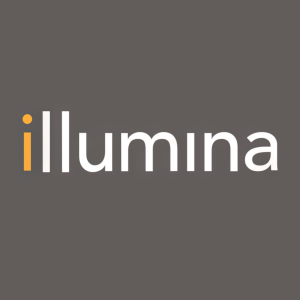Illumina constellation mapped read technology uncovers hard-to-see genomic insights in GeneDx pilot
Rhea-AI Summary
Illumina (NASDAQ: ILMN) said GeneDx piloted its emerging constellation mapped read technology on 160 DNA samples and reported improved detection of hard-to-map variants versus orthogonal methods. The pilot identified repeat expansions (DMPK), SMN1 events, NCF1-related variants, complex structural variants, and mosaic aneuploidy across blood, buccal, and prenatal samples.
Constellation uses on-flow-cell long molecules with proprietary informatics to resolve homologous and repetitive regions. A commercial product is planned for H1 2026. GeneDx results were presented at ASHG on Oct 15, 2025.
Positive
- Pilot evaluated 160 DNA samples
- Detected clinically relevant variants in DMPK, SMN1, and NCF1
- Performs across blood, buccal, and prenatal sample types
- Commercial product slated for H1 2026
Negative
- Product launch risks: manufacturing and supplier challenges cited
- Customer adoption uncertainty for newly launched products
News Market Reaction
On the day this news was published, ILMN gained 2.20%, reflecting a moderate positive market reaction. Our momentum scanner triggered 19 alerts that day, indicating notable trading interest and price volatility. This price movement added approximately $327M to the company's valuation, bringing the market cap to $15.17B at that time.
Data tracked by StockTitan Argus on the day of publication.
Illumina's up-and-coming constellation innovation delivers accuracy, speed, and ease of use in trial by GeneDx
Constellation outperformed orthogonal methods in identifying select difficult-to-map variants
"Illumina is unlocking ways to access the most difficult regions of the genome, as we simultaneously lead the industry into a new era of multiomics," said Steve Barnard, chief technology officer of Illumina. "Genomic insights remain critical to advance diagnosis and treatment for many rare and complex diseases, and our constellation technology provides the research insights that enable our customers to tackle these challenging conditions on the platforms they already use."
For the pilot project, GeneDx used its fleet of NovaSeq X Plus Systems with constellation kits to evaluate 160 DNA samples from individuals with known genetic disease. GeneDx compared samples run with constellation to orthogonal methods, like long-read sequencing, arrays, and multiplex ligation-dependent probe amplification. Constellation was able to accurately uncover repeat expansions, complex structural variants, and elusive regions of the genome, demonstrating the technology's ability to meet or exceed the capabilities of established alternative methods.
Constellation was able to quickly identify difficult-to-detect, biologically relevant variants, including those in:
- DMPK , which is associated with myotonic dystrophy and is caused by large repeat expansions;
- SMN1 , which is associated with spinal muscular atrophy but is difficult to detect based on the highly homologous SMN2 gene;
- NCF1 , which is associated with an inherited immune disorder called chronic granulomatous disease, but is challenging to identify due to highly homologous pseudogenes; and
- Mosaic aneuploidy, which causes some cells to have chromosomal abnormalities. It can cause developmental delays and increase the risk of some childhood cancers.
Deep and rapid insights from whole-genome sequencing can help researchers understand and better identify potential treatments for these hard-to-diagnose conditions. Constellation is emerging as a flexible solution that performs accurately across a variety of sample types—including buccal, blood, and chorionic villus (prenatal) samples—and extraction kits.
"Innovation and patient centricity fuel everything we do at GeneDx," said Devaney. "We're continually looking to advance research and clinical genomics to drive the future of precision medicine and better health outcomes for all. The level of detail we can achieve with constellation provides promising insight into some of the world's most complex and difficult-to-diagnose diseases. By combining speed, simplicity, and scientific rigor, this technology has the potential to transform how we understand rare disease, helping improve how we diagnose and treat patients."
How constellation mapped read technology works
Constellation builds on Illumina's industry-leading sequencing-by-synthesis chemistry to unlock long-range genomic insights with unmatched simplicity. Long sequences of unfragmented DNA are applied directly to the flow cell for cluster generation. This on-flow-cell library prep eliminates manual library preparation and enables a streamlined workflow with fewer validation steps. Proprietary informatics extract long-distance data from the proximity of resulting neighboring clusters. This novel data allows for accurate mapping of homologous or repetitive regions of the genome, resolving mapping ambiguities, and resolving complex variant types.
Constellation was first introduced at the 2024 ASHG conference. The first commercially available product based on constellation technology is slated for release in the first half of 2026, compatible with the NovaSeq X Series.
Joe Devaney will present the results of GeneDx's expanded, 160-sample study with constellation on October 15 at the ASHG Annual Meeting in
Use of forward-looking statements
This release may contain forward-looking statements that involve risks and uncertainties. Among the important factors to which our business is subject that could cause actual results to differ materially from those in any forward-looking statements are: (i) challenges inherent in developing and launching new products and services, including modifying and scaling manufacturing operations, and reliance on third-party suppliers for critical components; (ii) our ability to manufacture robust instrumentation and consumables; and (iii) the acceptance by customers of our newly launched products, which may or may not meet our and their expectations, together with other factors detailed in our filings with the Securities and Exchange Commission, including our most recent filings on Forms 10-K and 10-Q, or in information disclosed in public conference calls, the date and time of which are released beforehand. We undertake no obligation, and do not intend, to update these forward-looking statements, to review or confirm analysts' expectations, or to provide interim reports or updates on the progress of the current quarter.
About Illumina
Illumina is improving human health by unlocking the power of the genome. Our focus on innovation has established us as a global leader in DNA sequencing and array-based technologies, serving customers in the research, clinical, and applied markets. Our products are used for applications in the life sciences, oncology, reproductive health, agriculture, and other emerging segments. To learn more, visit illumina.com and connect with us on X, Facebook, LinkedIn, Instagram, TikTok, and YouTube.
About GeneDx
GeneDx (Nasdaq: WGS) is the global leader in rare disease diagnosis, transforming the way medicine is practiced by making genomics the starting point for health, not the last resort. We bring together unmatched clinical expertise, advanced technology, and the power of GeneDx Infinity™ – the largest rare disease dataset – built over 25 years from millions of genomic tests and deep clinical insights. This unparalleled foundation powers our ExomeDx™ and GenomeDx™ tests, giving clinicians the highest likelihood of delivering a timely, accurate diagnosis. GeneDx is shaping the future of healthcare by moving the standard of care from sick care to proactive healthcare. While our roots are in rare disease diagnosis, our commitment extends beyond – growing with the families we serve – as a trusted partner at every stage of life. For more information, visit genedx.com and connect with us on LinkedIn, Facebook, and Instagram.
Contacts
Illumina
Investors:
Illumina Investor Relations
858-291-6421
IR@illumina.com
Media:
Christine Douglass
PR@illumina.com
GeneDx
Investors:
Investors@genedx.com
Media:
Press@genedx.com
![]() View original content to download multimedia:https://www.prnewswire.com/news-releases/illumina-constellation-mapped-read-technology-uncovers-hard-to-see-genomic-insights-in-genedx-pilot-302584845.html
View original content to download multimedia:https://www.prnewswire.com/news-releases/illumina-constellation-mapped-read-technology-uncovers-hard-to-see-genomic-insights-in-genedx-pilot-302584845.html
SOURCE Illumina, Inc.








